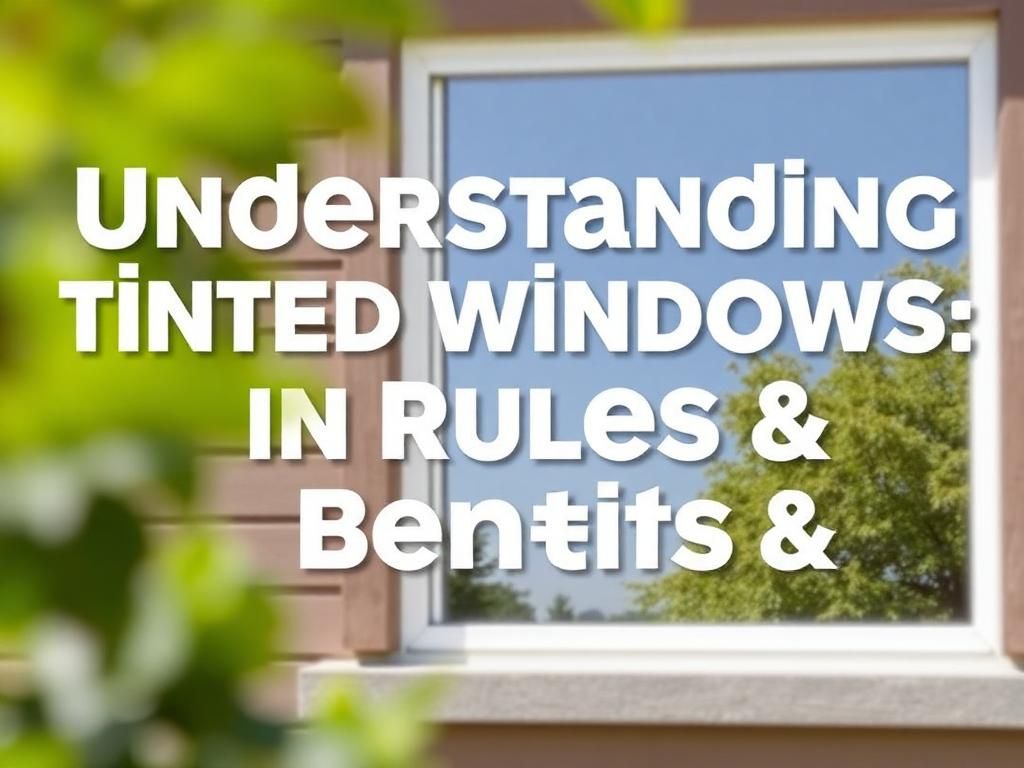The concept of tinted windows has gained immense popularity among vehicle owners, not just for aesthetic appeal but also for practical benefits such as UV protection, heat reduction, and privacy enhancement. However, it’s crucial for Massachusetts residents to understand the specific laws that govern window tinting within the state. Navigating these regulations ensures that you can enjoy the advantages of tinted windows while remaining compliant with state laws.
In Massachusetts, fancy shades may come with limitations. The state’s laws regarding tinted windows are designed to enhance road safety and visibility, creating a balance between personal preference and public safety. This article will provide a thorough overview of tinted windows in MA law, covering the essential aspects such as legal limits, benefits, consequences of non-compliance, installation best practices, and additional resources.
Overview of Window Tinting
What is Window Tinting?
Window tinting involves applying a thin film to your vehicle’s windows to alter their transparency and reduce the amount of visible light that enters. Different types of window tinting include:
– Dyed Tint: This is the most common type, which relies on dye to achieve color and shade.
– Metallic Tint: This type contains metallic particles that reflect heat and light but may interfere with electronic signals.
– Ceramic Tint: This high-end option is non-metallic, providing advanced UV protection with minimal signal interference.
Benefits of Tinted Windows
Understanding the benefits of tinted windows is essential for any vehicle owner considering this upgrade:
– UV Protection: A quality tint can block up to 99% of harmful UV rays, protecting passengers from skin damage and preserving the interior of the vehicle.
– Heat Reduction: Tinted windows help regulate the interior temperature, reducing the need for air conditioning and improving fuel efficiency.
– Privacy Enhancement: Tinted windows provide a sense of privacy, making it difficult for outsiders to see inside your vehicle.
– Aesthetic Appeal: A vehicle with tinted windows often looks more appealing and can enhance its overall appearance.
Massachusetts Window Tinting Laws
Legal Limits on Tint Darkness
Massachusetts law regulates the darkness of window tints, measured in terms of Visible Light Transmission (VLT). The VLT percentage refers to how much light can pass through the tinted window.
Legal Limits by Vehicle Type: The legal limits for cars, SUVs, and vans in Massachusetts are as follows:
| Window Type | VLT Limit (%) |
|—————————————|——————————-|
| Front Windshield | 35% or more |
| Front Side Windows | 35% or more |
| Rear Side Windows | No limit |
| Back Windshield | No limit |
It’s important to note that any tint must allow a minimum of 35% light through, making excessively dark tinting illegal in Massachusetts.
Reflectivity Regulations
Reflectivity refers to the amount of light that is reflected away from the window surface. Massachusetts laws also define acceptable levels of reflectivity:
– Front Windshield: Must allow more than 70% of light in.
– Front Side Windows: Must allow more than 35% of light in and have a reflectivity of 35% or lower.
– Rear Side and Back Windows: No restrictions on reflectivity.

Adhering to these regulations is essential to avoid penalties and ensure road visibility.
Exemptions and Special Cases
Certain exemptions apply to promote safety and accommodate specific needs:
– Medical Exemptions: Individuals with documented medical conditions may receive a permit to allow darker tints. Guidelines for obtaining medical exemptions include necessary documentation from a licensed physician.
– Special Vehicles: Vehicles classified under special categories, such as limousines and taxis, may have different tinting regulations. Contact local authorities for accurate information on these vehicles.
Consequences of Non-Compliance
Penalties for Violating Tint Laws
Non-compliance with tinted windows in MA law can lead to significant penalties. These may include:
– Fines and Fees: Offenses can result in fines ranging from $100 to $1,000, depending on the severity of the violation.
– Points Added to Driving Record: Violating tint laws can lead to points added to your driving record, potentially affecting insurance rates and driving privileges.
Enforcement and Ticketing
Law enforcement has various methods for identifying illegal tinting, including:
– Visual Inspections: Officers are trained to recognize excessive tinting during traffic stops.
– Roadside Inspections: Officers may conduct inspections at checkpoints or during traffic accidents to verify compliance with tinting laws.
Staying compliant with tinted windows in MA law is essential to avoid these unnecessary inconveniences.
Best Practices for Installing Tinted Windows
Choosing the Right Tinting Service
Selecting a reputable tinting service is crucial for a satisfactory and legal experience. Consider the following:
– Licensed and Certified Installers: Always choose professionals with the necessary certifications to ensure compliance with Massachusetts laws.
– Factors to Consider: Look for installers with good reviews, a solid reputation, and warranties on their work to ensure quality and accountability.
Understanding Tinting Products
Familiarity with different tint film brands and types available on the market is vital. Research is necessary to ensure that your choice will comply with Massachusetts regulations while providing the benefits you seek. Prioritize products that adhere to the VLT and reflectivity limits set by state law.

Conclusion
Staying informed on tinted windows in MA law is crucial not only for compliance but also for optimizing the benefits of your vehicle. Understanding the limits on darkness and reflectivity, alongside potential exemptions, helps vehicle owners make educated decisions. By adhering to these regulations, you can enjoy the advantages of tinted windows while prioritizing safety on the road.
Additional Resources
Links to Official Massachusetts Regulations
For further information on Massachusetts tinting laws, visit the official Massachusetts Registry of Motor Vehicles website: Motor Vehicle Tinting Laws.
Contact Information for Local Authorities
For specific questions about window tinting regulations, consider reaching out to your local Department of Motor Vehicles (DMV). They can provide clarity on regulations and exemptions that may apply to your situation.
Additional Reading and References
To explore more on window tinting best practices and benefits, check out reputable automotive articles or guides, such as those found on Tinting Laws.
FAQ Section
1. What is the legal tint limit in Massachusetts?
The legal tint limit for front windows is 35% VLT, while rear side and back windows have no limits.
2. Can I get a medical exemption for darker tints?
Yes, individuals with specific medical conditions can apply for a permit to have darker tints on their vehicles.
3. What are the penalties for having illegal window tint?
Penalties can include fines ranging from $100 to $1,000 and points added to your driving record.
4. Is reflectivity of window tint regulated in Massachusetts?
Yes, Massachusetts regulates reflectivity; front windows must allow more than 35% light, and the reflectivity should be no more than 35%.
5. How can I ensure my tinting is compliant with Massachusetts laws?
Choose licensed installers who are knowledgeable about Massachusetts laws, ensuring they use compliant products.
6. Do SUVs and vans have different tinting rules?
No, the tinting rules apply similarly to cars, SUVs, and vans under Massachusetts law.
7. How do law enforcement officers identify illegal tinting?
Officers use visual inspections and can conduct roadside checks to verify if the tint complies with state regulations.
8. Are there special regulations for taxi and limousine vehicles?
Yes, special regulations may apply; you should check with local authorities regarding compliance.
9. Can I apply tints myself?
While DIY tinting is possible, it may lead to non-compliance with laws and potentially unsafe conditions; professional installation is recommended.
10. How often do Massachusetts window tinting laws change?
It is advisable to check for updates regularly as laws can change; your local DMV is a good resource for this information.